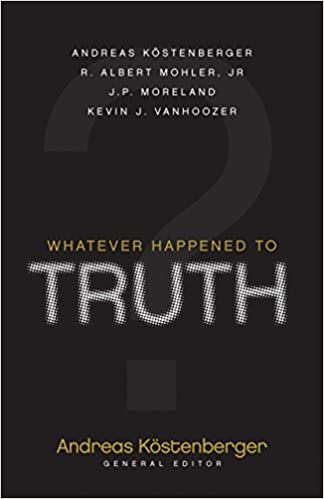A Brief Book Summary from Books At a Glance
By Steve West
Introduction
This book consists of four addresses that were presented at the Evangelical Theological Society by Andreas Köstenberger, Al Mohler, J. P. Moreland, and Kevin Vanhoozer. The addresses deal with various aspects of the relationship between truth, postmodernism, philosophy, culture, evangelical theology, and the interpretation of Scripture.
Table of Contents
Introduction – Andreas Köstenberger
Chapter 1 “What is truth?” Pilate’s Question in its Johannine and Larger Biblical Context – Andreas Köstenberger
Chapter 2 Truth and Contemporary Culture – R. Albert Mohler
Chapter 3 Truth, Contemporary Philosophy, and the Postmodern Turn – J. P. Moreland
Chapter 4 Lost in Interpretation? Truth, Scripture, and Hermeneutics – Kevin Vanhoozer
Epilogue – Andreas Köstenberger
Summary
Chapter 1: “What is truth?” Pilate’s Question in its Johannine and Larger Biblical Context
The question of truth is of maximal importance. It has driven endless philosophical and intellectual quests. Greek and Roman thought tended to see truth as correspondence to the nature of events and the accurate depiction of reality. In Hebrew thought the notion of truth was bound up with the faithfulness of God. In John’s Gospel, the concept of truth is tied to God, and to Jesus’ relationship with God. It is a theological and Christological concept. We can only know truth by knowing God through Jesus Christ.
Some have challenged the historicity of John’s account of Jesus’ trial before Pilate, but although John does include unique material, there are also strong parallels for authenticity with the Synoptics. When John’s Gospel overlaps with one of the Synoptics, they agree quite closely, which strengthens an assessment of the reliability of John. It is entirely plausible that John wrote to supplement the Synoptic accounts. Where we do not have Synoptic parallels, the presentation that John gives of Pilate does cohere with what we know of Pilate’s personality and behavior from history. The scarcely veiled political threats of the Jews towards Pilate in John’s accounting resonates with the historical and political backdrop of Pilate’s governance. The manner in which Jesus responds to Pilate also matches his style before Pilate in the Synoptics. Jesus often provided indirect answers and counter-questions.
The trial before Pilate also accords with the Johannine themes of the trial motif, Jesus’ kingship, and the issue of truth. In John’s Gospel, there is a focus on witness and judgment, and the meaning of the kingship of Christ. Multiple references to truth in the Gospel set up the exchange that Jesus has with Pilate over the nature of truth. Pilate’s question is one that John wants every reader to be confronted with. It is important to recognize the role that the Jewish leaders play at Jesus’ trial—it is not merely Jesus and Pilate who are the main characters. Pilate doesn’t understand the implications of the Messianic concept, but the religious leaders are supposed to, and they reject Jesus even after hearing his teaching and seeing his signs. At the trial, Pilate demonstrates a lack of comprehension of the claims, and he is impatient with Jesus. His rhetorical question dismisses the idea that he might be interested in the kind of kingdom Jesus can offer.
It is tragic that Pilate fails to recognize the opportunity he is given before the King. Nevertheless, we must remember that the trial is not about Pilate: it is about presenting Jesus. In order to answer Pilate’s questions, Jesus must get Pilate to recognize that the Roman definition of kingship is not applicable to himself. Truth calls for personal response—everyone on the side of truth listens to Jesus. As Pilate questions Jesus, the reader of the Gospel has already been given the answers to his questions in earlier material. Even though Jesus is condemned to death, he is the ultimate victor in the trial, since he is resurrected. Pilate’s question and response are ironic, given that a trial should try to determine what’s true. He stands in parallel with others who rejected Jesus. The Jewish leaders cannot blame Pilate and the Romans. Jesus is the truth crucified, and in the resurrection truth triumphs over secular power. . . .
[To continue reading this summary, please see below....]The remainder of this article is premium content. Become a member to continue reading.
Already have an account? Sign In
Buy the books

WHATEVER HAPPENED TO TRUTH?, edited by Andreas J. Köstenberger